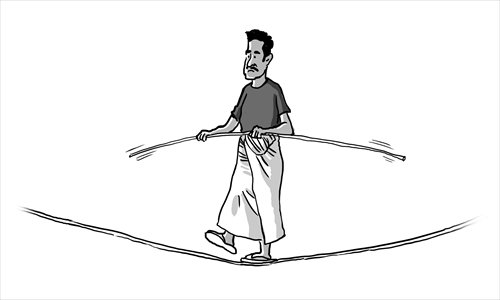Sino-Myanmese ties to stay close despite US interference

Illustration: Liu Rui/GT
Since Barack Obama was reelected, the US has gradually adjusted its rigid sanctions against Myanmar to a policy of sanctions and engagement. With the deepening of the Myanmar reform and opening-up process, Washington's policy seemingly has had a negative impact on the China-Myanmar relationship.
US ties with Myanmar seemed to peak in November 2012 when Obama paid a historical visit to the country. However, the influence of the US on Myanmar remains difficult to gauge.
US efforts to mend relations with Myanmar are to a large extent targeted at China. Stirring up troubles in China's surrounding regions and blocking China's cooperation with its neighborhood are key methods used by the US to contain China.
The US influence can be seen in the deteriorating South China Sea disputes, reproaches from the downstream countries of the Mekong River regarding damage caused by dams constructed by China, and the suspension of the Chinese-invested Myitsone Dam in Myanmar.
It's true that the competition between China and the US in Myanmar is not a zero-sum game. The goal of US efforts to contain China is to ensure the two countries won't have a direct confrontation. But the US will try to foment discord between China and Myanmar.
In November 2011, US former secretary of state Hillary Clinton delivered a speech in South Korea before she visited Myanmar. "Be wary of donors who are more interested in extracting your resources than in building your capacity," she said. "Some funding might help fill short-term budget gaps, but we've seen time and again that these quick fixes won't produce self-sustaining results."
Undoubtedly, Clinton was chiding aid and investment from China to Myanmar.
However, Myanmar is unlikely to totally throw itself into the arms of the US. Mired in financial crisis, Western countries cannot afford to provide considerable economic assistance to Myanmar.
Although the West has lifted sanctions on Myanmar, the US and European enterprises are reluctant to invest in a land where the investment environment is not good and the political situation is not stable.
China, India and ASEAN will still remain important economic partners in the future, and the US cannot replace China in Myanmar's economic development.
Myanmar elites have realized this, including the Speaker of Myanmar's Lower House of Parliament Shwe Mann and leader of the opposition party Aung San Suu Kyi. Both have emphasized the importance of maintaining a sound relationship with China while normalizing relations with the US.
Admittedly, the development of US-Myanmar ties does exert a certain impact on Myanmar's relations with China.
In terms of official relations, Myanmar will probably become more cautious toward its cooperation with China, especially in terms of strategic and security issues, and take the US attitude and reaction as the foremost factor when promoting its ties with Beijing, so as to avoid offending Washington.
Once China and the US hold different views on major international and regional issues, Myanmar will not firmly stand by China any longer but try to strike a balance between the two powers, and sometimes even show more intimacy with the US-led West.
Regarding people-to-people exchanges, with the advance of bilateral relations, US democracy and values will wield growing impact on Myanmar people whose sense of affinity for China's political system and ideology will be reduced.
Myanmar's decision to develop relations with Western countries is understandable and acceptable for China. Beijing should continue consolidating its collaboration with Nay Pyi Taw in accordance with relevant strategies and policies.
Myanmar is now dependent on China to a certain degree. The region north of Mandalay has forged close trade links with China, so it is necessary for Myanmar to involve China in its modernization drive.
Whatever changes occur in Myanmar's political situation, Beijing will still play a vital role in affecting the major decisions made in Nay Pyi Taw. As long as Beijing continues to boost the good momentum in its ties with Myanmar, improved US-Myanmar relations will not lead to disruptive changes in China-Myanmar ties.
The author is a professor at the School of International Studies, Yunnan University. opinion@globaltimes.com.cn
Related article: Myanmar sits on the corner of an international triangle